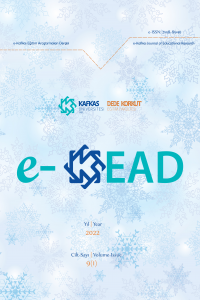Articles
Issue Editorial Board

Ali İbrahim Can GÖZÜM is a prolific author and researcher both nationally and internationally. He was awarded a faculty honor certificate as the top performer in the Faculty of Education at Kafkas University between 2005 and 2009.
Currently, Dr. GÖZÜM serves as an Associate Professor in the Department of Early Childhood Education at Kafkas University Faculty of Education in Turkey. He completed his doctoral studies in the Departments of Early Childhood Education at Gazi University and Science Education at Ondokuz Mayıs University. His expertise lies in science and technology education in early childhood.
Moreover, he holds the position of Editor-in-Chief at the open-access journal "e-Kafkas Journal of Educational Research" and serves as an associate editor for the STEM Education section of the journal "Frontiers in Education." Dr. GÖZÜM has also contributed as a peer reviewer for numerous journals indexed in Web of Science and Scopus.

Dr. Ali SAĞDIÇ graduated as the top performer from the Department of Science Education at Gazi University in 2010. He completed his master's degree in 2013 and his Ph.D. in 2019 at Middle East Technical University. His research primarily focuses on education for sustainable development, astronomy education, conceptual change, and scientific literacy.

Lisans: 2007-2012 Uludağ Üniversitesi Türkçe Öğretmenliği
Y.lisans: 2013-2015: Erzincan Üniversitesi Türkçe Öğretmenliği
Doktora: 2015-2019: Gazi Üniversitesi Türkçe Öğretmenliği
Ales Dereceleri: 103.lük (95 puan) ve 142.lik (92 puan)
APA üyeliği.
Aim & Scope
e- Kafkas Journal of Educational Research is the publication of Kafkas University Dede Korkut Faculty of Education. The journal is published electronically three times a year. It is a peer-reviewed and scientific journal. The approach of the journal is the open-access journal system. The articles that will be published in e-Kafkas Journal of Educational Research will be evaluated by the reviewer board after the pre-examination by editors of the journal. In this process, the articles are scientifically evaluated by the reviewer board through the double-blind peer-reviewed system. The ideas, opinions, thoughts, suggestions etc. in the articles are under the responsibility of the respective authors. The Journal does not charge for article submission, processing, and publication. It has the status of a periodically published 8-year International Refereed Journal and has adopted the basic principle of fulfilling its publishing responsibilities based on COPE (Code of Conduct for Journal Editors).
e-Kafkas Journal of Educational Research (e-KJER) publishes studies using scientific research methods and techniques in all the basic fields of educational sciences. The main aim of the journal is to contribute to the educational processes and related fields such as Computer and Instructional Technology Education, Religious Culture and Ethics Education, Educational Sciences, Fine Arts Education, Mathematics and Science Education, Special Education, Psychological Counseling and Guidance, Social Sciences Education, Primary Education, Turkish Education, and Foreign Language Education.
The studies are to be accepted for the publication in accordance with the aim of e-KJER:
• Scientific studies that investigate, question the problems and improve their applications in all levels of education,
• Scientific studies aimed at developing the competencies of trainers and facilitating their application activities of trainers,
• Scientific researches designed with quantitative, qualitative and mixed methods,
• Scientific studies that can contribute to the holistic development of students in all levels of education,
• Scientific studies that evaluate research methodology, the original, educational theory, and model in accordance with scientific research methods
• Interdisciplinary scientific studies conducted by researchers from different fields of study,
• Scientific studies that test the validity, reliability, and applicability of data collection tools which test and evaluate psychometric properties to be used in education,
• Scientific studies aiming at the development and testing of educational technology and teaching materials and integration of them into teaching activities.
Author Guidelines
The articles sent to e-Kafkas Journal of Educational Research (e-KJER) should be prepared according to the submission format below:
Page layout: A4 Vertical, margins (normal) (2,5 cm from each side)
e-KJER does not have a restrictive approach to the word number and page. However, the editorial board and science committee may suggest that the study can be shortened without losing its quality.
Heading
The title of the study should be inclusive and clearly reflect the content. Initials of every word should be capitalized except conjunctions. Title should be written in Times New Roman font, bold, 12 pt, center-aligned, and single line spacing.
Abstract
In the abstract, the purpose, scope, method, findings, and conclusion of the study should be briefly stated. Turkish and English abstracts should be between 200-300 words. The abstract should be written in Times New Roman font 11 pt, 6-0 nk paragraph spacing, and single line spacing.
Keywords:
Keywords of the study should consist of minimum 3 and maximum 5 words.
Introduction
The text should be written in Times New Roman font, 11 pt, single line spacing, 1.25 paragraph indent and 6-0 nk paragraph spacing. Tab key at the beginning of the paragraph, enter key between paragraphs should not be used. One letter spacing should be left after the punctuation marks and between the words.
Method
The research model, population-sample / study group, data collection tools, validity and reliability of data collection tools, data collection techniques, data analysis, limitations should be detailed.
Findings
The findings obtained in the research can be explained with tables, figures, graphics or pictures in accordance with the purpose of the study.
Conclusion, Discussion and Suggestions
The main ideas that emerged in the light of the findings of the research should be explained and discussed. Suggestions can be made according to the findings of the study. In addition, suggestions can be made for future studies and practices that will contribute to the literature.
References
The references should be written in Times New Roman font, 11 pt, single line spacing, XXX hanging, and 0-0 nk paragraph spacing in accordance with APA 6 references.
Appendix
The appendix should be given on a new page after the references. Every appendix should be ordered like appendix 1, appendix 2, and so on. For the text presented in this section, the font properties used in the main text are valid.
Tables and figures
Tables and figures in the text should be arranged considering the sample article template.
Extended summary
Extended summary section is not asked for the articles written in English. However, an extended summary of the study for Turkish articles needs to be added at the end of the study. This part should be between 1000 and 1500 words. As in the content of the article, “introduction”, “method”; “Conclusion, suggestion, and recommendations" headings should be clearly stated in the extended summary. The extended summary should also be prepared in line with the font properties used in the main text.
You can access the sample article template prepared in line with the e-KJER writing rules in the Forms and Templates section.
Ethical Principles and Publication Policy
Similarity rate control
e-Kafkas Journal of Educational Research applies internationally accepted principles on ethical issues, errors, or discontinuities. To prevent the discontinuities of publication of scientific papers submitted to the journal is among the critical responsibilities of the editorial board. Unethical behaviors that can be observed in scientific studies are not acceptable. It is the responsibility of the authors to declare that the contents of the scientific researches submitted to the journal are prepared from the original. In this regard, articles submitted to the journal are accepted after passing through the plagiarism program (Ithenticate). The similarity of the article sent to the journal should not be more than 15%.
Measures against ethical violations
e-Kafkas Journal of Educational Research has adopted the principle of fulfilling its publishing responsibilities based on the COPE Code of Conduct for Journal Editors. In accordance with this principle, the editorial board, referees, and authors are obliged to apply the procedures in the journal application and evaluation processes within the scope of ethical committees.
The similarity rate of the candidate articles should be uploaded to the journal by the authors. In addition, the corresponding author has to declare that there is no plagiarism in the article by uploading the similarity rate statement file. Candidate articles are also reviewed by the journal secretariat for plagiarism with the Ithenticate program. Articles exceeding the similarity rate determined by the journal are returned to the authors.
For published articles, in case of any ethical complaint within 12 months, the editorial board examines the article. Documents related to the complaint should be sent to the editorial board of the journal via journal e-mail.
e-Kafkas Journal of Educational Research reports that any unethical work involving ethical violations such as abuse, the relationship of interest, or unlawful work of others is unacceptable and all legal rights are reserved.
Responsibilities of editors
Responsibilities for publication decisions, confidentiality, informing and disagreements that must be followed by the editor, editorial board, field editor are listed below. The editor, editorial board, and field editors of e-Kafkas Journal of Educational Research are obliged to comply with the following responsibilities.
Publication decisions: The editor is responsible for reviewing the field editors of the manuscripts submitted to the journal and making the decision to publish as a result of the referees' evaluation. The editors evaluate the decisions of the publications without considering the ethnic, race, gender, sexual orientation, religious belief, sect, nationality, political views or article suggestions. The decision of the editor is based on e-Kafkas Journal of Educational Research considering the journal's purpose, scope, originality, suitability for the validity, importance and timeliness of the study.
Confidentiality: The editorial board cannot share the scientific studies sent to e-Kafkas Journal of Educational Research with the other persons and institutions except for the authors, referees, members of the editorial board and the publisher.
Informing and disagreements: Unpublished content of the scientific study sent to e-Kafkas Journal of Educational Research cannot be used by the editorial board members and the persons who are responsible for the publication of the study without the permission of the author(s).
Responsibilities of referees
The responsibilities like time, confidentiality, impartiality standards, citations, information, and view discrepancies to be followed by the referees, are stated below. The referees accepting the evaluation process of the articles accepted by the editor/editorial board of e-Kafkas Journal of Educational Research are obliged to comply with the following responsibilities.
Time: In cases where the referees do not consider themselves having sufficient knowledge for the content of the manuscript submitted to be considered or they cannot assess the manuscript during the proposed evaluation period because of the time limitations, the referees should inform the editor and asked to be withdrawn from the evaluation process.
Confidentiality: The article proposal sent to the referees should be accepted as a confidential document and no information should be given to third parties about its content.
Impartially standards: The evaluations made by the referees should be made in accordance with the standards of impartiality. Personal criticism of the author is not appropriate. The opinions and suggestions made by the referees should be supported by arguments in accordance with scientific principles and should be clearly and comprehensibly expressed.
Citations: If the previously published scientific articles related to the proposed article sent to the referees are not included in the proposal article, it may be requested by the referees to include the related studies in the proposed article. References should be reviewed by the referees considering the citation rules of the journal and errors should be indicated. Referees evaluating the proposal article should inform the editor, editorial board, or field editors about the similarity or originality between the previously published studies and the proposal article.
Informing and view discrepancies: Unpublished articles proposed for review, data specific to the research content, and thoughts related to the proposal should not be used for personal benefit after the review by referees. In the proposal articles sent for reviewing, referees should not take into account any conflict of interest arising from the benefit or loss of the author, company, or institution.
Responsibilities of authors
Reporting standards that should be followed by the authors, that is, originality, multiple, dysfunctional or repetitive studies, citation, authorship, data access, and protection, responsibility for basic errors in published studies are listed below. The authors whose articles are accepted for publication by the editor/editorial board of e-Kafkas Journal Educational Research are responsible for obeying the following rules.
Reporting standards: Authors should emphasize the originality of their work as well as the purpose, importance of the study. The manuscripts submitted to the journal should comply with the journal reporting standards. (Please see the writing rules and reference guidelines in the Author's Guide Menu).
Originality: Authors should state that the whole of the article they propose for publication in the journal is original.
Multiple, dysfunctional, or repetitive studies: Authors should not submit the manuscripts which are submitted to e-Kafkas Journal of Education Research to other journals simultaneously. Furthermore, the articles published in e-Kafkas Journal of Educational Research are expected not to be published in any other journal in the future.
Citation: Authors should specify the sources of the data they use in their articles in accordance with the writing rules in the text and bibliography.
Authorship: The authors of the articles submitted to e-Kafkas Journal of Educational Research should contribute significantly to the formation of the article in the design, conceptualization, implementation, or interpretation of ideas. The authors assume full responsibility for the accuracy of the information of the names of all authors who contributed to the proposal article and their contact information.
Data access and protection: The data which are not analyzed for the proposal articles should be protected and kept in order to present them to the editor when necessary.
Basic errors in published articles: In case of an error or uncertainty about the proposal article submitted by the authors, they should report the issue to the editors.
Note: The authors cannot retain the copyrights and full publishing rights without the permission of journal ediors' committee. This is guaranteed with the copyright aggreement form of journal, which authors have to accept that their copyrights are transferred to the journal. You can see the journal's copyright transfer aggreement form in Forms and Templates section.
Price Policy
In line with the Open Access Policy, e-Kafkas Journal of Educational Research does not charge any fees for article submission, review, and publication processes. Our journal is totally free to use for all processes.







